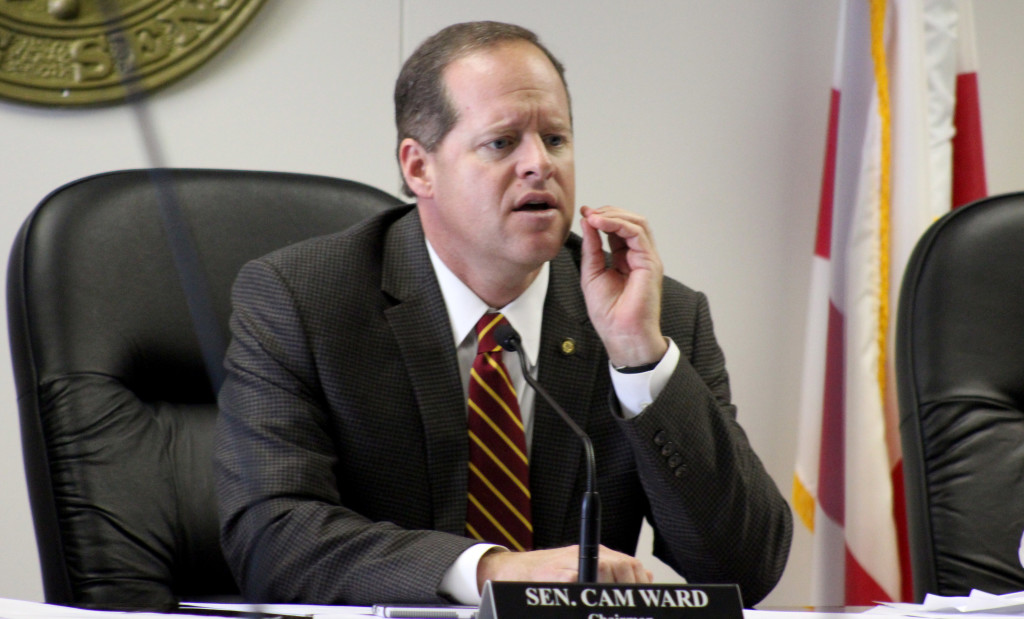Robert Bentley signs bill to cut business ties with Israel boycotters

Score another victory for the pro-Israel lobby, this time in the Alabama statehouse. Gov. Robert Bentley has given final approval to a law banning firms that boycott Israel from doing business with Alabama state and local governments. SB81, sponsored by Republican Sen. Arthur Orr, restricts any public entity in the state from entering into a contract with firm participating in the Boycott, Divestment and Sanctions movement, or BDS as it’s commonly known. Several major companies, trade unions, academic institutions around the world are refusing to engage in commerce with Israel over what they call human rights violations against the Jewish state’s Palestinian neighbors. But pro-Israel forces are fighting back around the nation, saying BDS boycotters unfairly target Israel and are motivated by hatred and anti-Semitism. Josh Block of the Israel Project for instance, a 501(c)(3) advocacy group based in Jerusalem and Washington, D.C., applauded the move by Bentley and state lawmakers. “BDS is discrimination cloaked in the language of human rights, but at its core, the effort to single out Israel is anti-Semitism, plain and simple,” said Block, TIP’s CEO. “I congratulate the people of Alabama, their legislators and their governor, for seeing through this dangerous ruse and standing strongly with the Jewish state against misguided efforts to attack and delegitimize America’s closest ally in the Middle East,” said Block. In enacting the new law, Alabama joins eight other states which have formally cut ties with BDS participants. The Florida Legislature passed a similar bill in March. That bill, like Alabama’s new law, sailed through the legislative process. Alabama senators passed the bill 30-0, while the House approved its version by a 84-5 vote. Arizona, Colorado, Georgia, Illinois, Indiana, South Carolina and Iowa also have anti-boycott laws on the books. In a release, the Israel Project said the bill “takes square aim at hateful efforts to single out Israel by preventing Alabama from entering into contracts with business entities unless they certify that they are not and will not engage in boycotts.” Critics of the anti-BDS movement say the laws are an undue incursion into private firms’ freedom of speech,
State bureaucrats killed anti-earmarking bill, says sponsor Cam Ward

When Sen. Cam Ward proposed an anti-earmarking bill, it made sense to the many fiscal hawks in conservative-dominated Montgomery. Alabama sets aside 91 percent of its General Fund revenue for predetermined purposes, the highest percentage in the nation and some four times the average. That can make it difficult to weather fiscal storms, leading to indiscriminate across-the-board cuts to state services — already less well-funded than even many of the state’s Deep South neighbors — when times are lean, and puts no pressure on state agencies to justify their spending, since they know last year’s appropriations are the automatic baseline for this year’s. So Ward introduced SB15, which would have “un-earmarked” some 15 percent of the state’s spoken-for funding, amounting to around $450 in the 2016 budget and presumably rising over time. Ward says such a move giving lawmakers more flexibility to set priorities and adjust to fluctuations in revenue, which can vary widely. The bill also contained provisions intended to keep intact state dollars which draw down federal funding, creating a multiplier effect in revenue which most consider sacred. It also softened the potential blow to services by leaving unchanged funding for critical services. But the bill died early on in the 2016 Legislative Session. The culprit, according to Ward? Those state agencies who draw down federal dollars and provide critical services, among others. Veterans groups publicly opposed the bill, after which supporters somewhat scaled back their plans to overhaul the way the statehouse budgets. But behind the scenes, Ward told Alabama Today, a cavalcade of other state government interests also blocked the way for Ward’s reform. Pushback from veterans was doubtless an obstacle, but advocates for less-than-critical spending also pushed to get their way, including interests on behalf of state parks, historical preservation, and the Department of Human Resources. Agencies that provide mental health services and rural fire departments also balked at the changes. Ward says business groups were on board with his effort. “They actually liked it,” said Ward. “It’s a great issue, but it’s tough to enact.” Ward, who chairs the Senate Judiciary Committee, says he’ll continue to push to unmoor spending from arbitrary markers and revamp a budgeting process that allows lawmakers discretion over less than 10 percent of overall funding. “It’s just a dysfunctional way to run a budget. It leaves you no way to deal with a crisis when it comes up,” said Ward.
Justice reform group blasts “fruitless” state prison reform bill

Proponents, including Gov. Robert Bentley, have lauded the Alabama Prison Transformation Initiative Act as a bold step toward real criminal justice reform. But on Wednesday, the U.S. Justice Action Network slammed the bill in a memo to reporters, calling it a “fruitless course” that would simply raise costs. “This bill does not fix Alabama’s prison overcrowding problem, but it will give taxpayers heartburn. Senate Bill 287 would trigger over $1.5 billion in costs and still leave the state with overcrowded correctional facilities,” said Holly Harris, Executive Director of the national group. . “We call on the Alabama House of Representatives to reject this plan and continue working on real reforms that provide a safer and more effective justice system,” said Harris. The group says the bill is set to cost state taxpayers $1.5 billion, according to USJAN’s calculations. The group’s work largely focuses on reducing prison populations. The bill’s sponsor, Decatur Republican Sen. Trip Pittman, chairs the powerful Finance and Taxation General Fund committee. The bill would also originally have enacted a moratorium on all executions until 2017, but that provision was struck from the bill in the Senate. Other groups, including liberal-leaning Alabama Arise, have pushed for the creation of an Innocence Inquiry Commission to review death penalty cases. The group has not taken any formal stance on SB 287, but are supporting an alternative, SB 237. An analyst for the group called such a move a “recognition of human frailty” in the state’s justice system, but such a provision does not exist in the bill currently circulated. SB 237 has attracted support from some minority-party Democrats, including Mobile Sen. Vivian Figures and Sen. Rodger Smitherman of Montgomery. —- This article was updated on May 2 to clarify Arise Alabama’s stances and disambiguate SB 287 & SB 237.
Jim Zeigler hoping for public showdown with Robert Bentley over ethics violations

On May 2, State Auditor Jim Zeigler “will be in my office at 10 a.m. with a court reporter, and a Bible to swear in the Governor.” Zeigler plans to grill Gov. Robert Bentley about accusations the governor misused public resources during an affair with a former adviser, the recently dismissed Rebekah Mason. On Monday Zeigler upped the stakes yet again, saying state law allows — indeed requires — the entire State Auditor’s probe to be open to the press and the public. Zeigler initially announced he would take Bentley’s testimony behind closed doors, presumably to spare the governor a modicum of disgrace. But after conducting some legal research, Zeigler said, the investigation is subject to open-government laws and must be done in full view of the public. “It is the public’s business, and we will allow news media and citizens to attend,” said Zeigler. Bentley, for his part, does not appear likely to show up. The governor has mostly ignored Zeigler’s request for an appearance in his office at the Capitol, though he did issue the following: “The appropriate legal process is through the Alabama Ethics Commission where the Auditor has already filed a complaint, and we are fully cooperating in every way,” said Bentley. “I do not intend to respond further to Mr. Zeigler.” The standoff is the latest in a series of jousting matches between the two fellow Republican members of the state’s executive branch. Bentley is supporting a bill this Legislative Session that would grant the governor power to appoint the State Auditor, revoking the office’s status as an elected position. Zeigler, in turn, has proposed an “executive recall” mechanism that would allow for Bentley to be removed from office via a petition signed by 10 percent of registered voters. In the meantime, Zeigler’s May 2 deadline hangs over the Zeigler-Bentley feud like the sword of Damocles. Zeigler says Code of Alabama statute, 36-16-2, authorizes his office to require just the kind of inquest into Bentley he is seeking. It reads: “The Auditor has authority to require information on oath, to be administered by him, from any person touching any claim or account he is required to audit.” While that seems to leave little room for interpretation, Bentley remains highly unlikely to fulfill Zeigler’s request to appear. Zeigler says he is looking into options regarding enforcement, and will pursue punitive measures should Bentley defy his order. “We will take action after May 2 if the order is not complied with. Since I set the May 2 date and time for compliance, I cannot do anything until that time has passed,” said Zeigler.
Pediatricians say state Medicaid cuts will reduce kids’ health care access

The state’s leading association of practicing pediatric doctors warned looming cuts to state Medicaid program could hurt Alabama’s children big time on Tuesday. The Alabama Chapter of the American Academy of Pediatrics held a conference call with reporters, warning them planned a planned reduction in the amount of money allocated to Medicaid will lead to a downward spiral in levels of care and quality. “Regardless of where you live in the state, the expected cuts to Alabama’s Medicaid program will significantly impact care to all children,” said Cathy Wood, MD, a pediatrician at Partners in Pediatrics Clinic in Montgomery and the president of the group. “Alabama’s children need homes for their medical care. Cutting Medicaid will disrupt a very fragile healthcare system in our state and we fear will ultimately crush it,” said Wood. Lawmakers in the Alabama Senate approved a budget which included $85 million fewer dollars for Medicaid-funded care than the state Medicaid Agency said it requires to keep care at the same – already underwhelming – status quo levels. Gov. Robert Bentley – who once went out on a political limb to support expanding Medicaid under the Affordable Care Act – now seems to have backed down to pressure, saying he would direct the agency to make cuts to sustain the program according to the new budget figures rather than seek greater funding. 500,000 children are enrolled in Medicaid, meaning nearly a huge share of the most vulnerable populations in America are relying on the outcome of the budget battle. The pediatricians said Tuesday that if the current budget were enacted, close to half would stop taking Medicaid for a portion of their patients, such as new patients, or patients from a certain geographic are, while about half would have to lay off staff. Additionally, the doctors’ group reported, more than one-third would stop taking Medicaid altogether, while one-sixth said they would retire or move out of state, depending on where they were in their careers.
Jim Zeigler will testify against bill to grant Governor power to appoint key Cabinet posts

State Auditor Jim Zeigler says his office is under attack by the administration of Gov. Robert Bentley, and Zeigler intends to fight back in the Capitol. Bentley and some allies in the Legislature want lawmakers want to pass a bill granting the Governor authority to appoint two key positions on the 7-member Cabinet: Commissioner of Agriculture and Industries, and you guessed it, State Auditor. Currently the positions are elected statewide by voters. The bill — HB 432, sponsored by Rep. Paul Beckman, a Republican from Prattville — would authorize a proposed amendment the Alabama constitution to change that. The legislation will be heard Wednesday, April 20 in the House Constitution, Campaigns, and Elections Committee. Beckman serves as Vice Chair of the panel. Zeigler will testify in person against the bill when the meeting convenes at 9 a.m. Zeigler, an outspoken critic of the Bentley administration, called the bill a “power grab” by the governor after Beckman introduced the bill in March. He says moreover the inclusion of the Ag Commissioner as part of the Cabinet shakeup is simply window dressing, “a strategy to make it look like they are not targeting me.” “I believe that I am the main target of this legislation,” said Zeigler of the proposal. Zeigler has also criticized the merits of the bill, which he says would eliminate a value check against executive power in state government. “Having the Governor appoint the State Auditor would be the fox guarding the hen house,” Zeigler said.
Jim Zeigler slams Robert Bentley, calls for “executive recall” mechanism to oust Governor

State Auditor Jim Zeigler is an old foe of Gov. Robert Bentley. Now that the governor is now embattled over accusations of inappropriate behavior towards a former staffer – and widespread opposition from members of his own Republican Party – Zeigler made remarks over the weekend indicating he does not intend to ease off now. Zeigler spoke to supporters of the so-called Common Sense Campaign, a conservative political group, in the town of Theodore over the weekend, away from the scourge of “Sodom and Montgomery.” There, he excoriated the governor for what he called — appropriating the famous Hank Williams song — “His Cheatin’ Heart.” “When tears come down like fallin’ rain / You’ll toss around and call her name,” recited Zeigler in a bawdy send-up of Zeigler. “But she won’t come the whole night through / because her cushy job is through.” Zeigler served up invective against both Zeigler and the lawmakers who have made little progress in fledgling efforts to impeach him. Calling his summary of the matter a “Lack of Progress Report,” Zeigler noted a bill to begin impeachment proceedings filed by Rep. Ed Henry has not been taken up in committee and stands little chance of passing before the Legislature adjourns by May 16. Zeigler said that means no legislative impeachment process could take effect until 2017 at the earliest. “The people of Alabama want and need a solution to the serious problems in the governor’s office soon, not in 2017,” said Zeigler. “To allow the dysfunction… to linger until 2017 is not acceptable.” Towards that end, Zeigler proposed legislative to create what he dubbed an “executive recall.” The bill, which he said was more likely to pass than existing mechanisms, would: Propose a constitutional amendment establishing a recall process for all seven members of the Cabinet, including the offices of governor and state auditor, to be voted on in November 2016; Provide that a petition by 10 percent of registered voters may trigger such a process; and If recalled, a special election to replace the governor would be held within 120 days. The process would avoid the usual order of succession should a governor step down, whereby an existing officer would take their place because that way, “The people remain in control, not Montgomery politicians.”
Alabama legislative wrap-up: April 11–15, 2016

Here’s your quick look at some of the major votes the Alabama House of Representatives and the Alabama Senate took this week: On Tuesday the Alabama Senate overwhelmingly passed SB 347, a bill legalizing the research and regulation of industrial hemp—the non-intoxicating version of the cannabis plant. A similar, but not identical, bill passed the Alabama House earlier in the day. To be sent to the governor’s desk the bill must make it through the conferencing process. On Wednesday a proposal to add an amendment to the state constitution that would keep GreeneTrack’s bingo casino operational narrowly failed. The amendment, sponsored by Sen. Bobby Singleton, a Greensboro Democrat, was shot down four votes shy of the necessary 21. The Alabama Senate passed Wednesday evening the Education Trust Fund budget, funding education in the state, as well as the first pay raise for teachers in several years. In the largest education budget from the state since 2008’s financial crash which sent the state’s budgets careening, the $6.3 billion expenditure funds everything from K-12 public classrooms to the implementation of new educational technology. The Alabama legislature nearly unanimously passed a new funding formula for the state’s roads and bridges Wednesday evening, in what legislators and outside groups are celebrating as a return to greater local control of transportation funds. The bill, SB 180, establishes the Alabama Transportation Safety Fund, which will receive revenues designated for “maintenance, improvement, replacement, and construction of state, county, and municipal roads and bridges within the state.”
Alabama House passes anti-human trafficking bill

The Alabama House has approved a bill to crack down on predators seeking to purchase sex via human trafficking, what many consider the last existing form of slavery in the United States. The bill – HB 433, dubbed the “Safe Harbor Act” – passed the House on a unanimous 103-0 vote on Thursday. Rep. Jack Williams, who chairs the Legislature’s bipartisan Alabama Human Trafficking Task Force formed in 2014, sponsored the bill. The legislation is designed to treat minors caught up in the sex trade as victims, rather than willful law breaker, as it often the case now. HB 433 provides that any minor found to have committed prostitution under state law not be transferred to or tried in adult court, and that a list of services including counseling, substance abuse treatment, legal representation, and medical treatment be made available to them. The bill also requires Alabama businesses operating an “escort business of companionship” to registered with the Secretary of State, and provides for penalties for violations of the rules therein. A similar bill, SB 368 by Democrat Sen. Vivian Figures, was also introduced this Session, but has not gotten a hearing in the Senate Judiciary Committee. Advocates for sex trafficking victims have estimated the trade is the second-largest criminal industry in the U.S., topped only by illegal drugs.
State Senate OKs payday lending reform bill

The Alabama Senate passed a bill Wednesday to extend the timeframe for repaying loans from so-called “payday” lenders to six months. Pressure to quickly repay payday loans – often at interest rates of 20 percent or higher, compounded over time – is a serious financial problem for many low-income Alabamians. Republican Sen. Bill Orr — who is sponsoring SB 91 — says he wants to make the state’s payday loan regime less “punitive.” Current law allows lenders to charge interest rates of 456 percent per year. Orr’s bill caps maximum annual interest at 180 percent. Democrats and advocates on behalf of low-income workers have long criticized the payday loan industry, but support for reform among Republicans is something relatively novel. According to the Montgomery-based Arise Citizens’ Policy Project, high payday loans rates not only hurt poor borrowers, but the economy at large. “Every dollar spent repaying payday loan interest takes nearly $2 out of the overall economy through reduced consumer spending and increased bankruptcies, according to a recent study by the Insight Center for Community Economic Development. The study calculated that payday lending cost Alabama $47 million – and 697 jobs – in 2011,” reads a policy memo in support of Orr’s bill. The legislation won approval by a 28-1 vote, and now moves to the House. If the bill meets with their approval, it would move on to the desk of Gov. Robert Bentley for his signature, assuming he isn’t impeached. The Colorado state Legislature passed similar legislation in 2010. A study by the Pew Charitable Trusts found that the number of payday stores in Colorado shrunk by half after the change. Information from the Associated Press was used in this report.
Ed Henry to bring forth “articles of impeachment” of Robert Bentley

Gov. Robert Bentley, who has been feeling the heat since allegations of an affair between him and former staffer Rebekah Mason surfaced, got more bad news Wednesday — Alabama House Rep. Ed Henry (R-Decatur) will bring forth articles of impeachment aimed at unseating the scandal-ridden governor. From all indications, he will have the support from both Republican and Democratic lawmakers who have vehemently decried the governor’s behavior since word of the scandal broke. Henry said he will carry the resolution to impeach Bentley for ineffective leadership, incompetence and violations rooted in moral turpitude. Further, Henry hopes to have the resolution ready to go before lawmakers when they return from spring break April 5. Henry believes that in order for the state to make any progress on economic development issues Bentley will have to be removed from office. Further, the Republican lawmaker accused Bentley of lying to the Alabama people since the beginning of his second term as Alabama’s governor. Henry continued that Alabama lawmakers have lost trust in the governor and his political standing has declined since sexually explicit recordings of phone conversations between Bentley and Mason came to light. If the impeachment resolution is able to clear the House, it will go to the Senate for final passage and Henry believes he has the votes in both chambers to get it through.
Robert Bentley admits making inappropriate remarks to staffer; denies affair

Alabama Gov. Robert Bentley is admitting that he made inappropriate remarks to a female staffer two years ago but says he never had a physical relationship with the woman. Bentley spoke to reporters Wednesday after the state’s former top law enforcement official made a series of accusations. That official, former Law Enforcement Secretary Spencer Collier, had been fired Tuesday. He said during a news conference that he believed the governor had an inappropriate relationship with a female staffer. Collier says another law enforcement officer played a recorded conversation for him in which Bentley makes sexual remarks to a woman. The governor divorced last year after Dianne Bentley said their marriage had suffered a breakdown. Republished with permission of the Associated Press.


